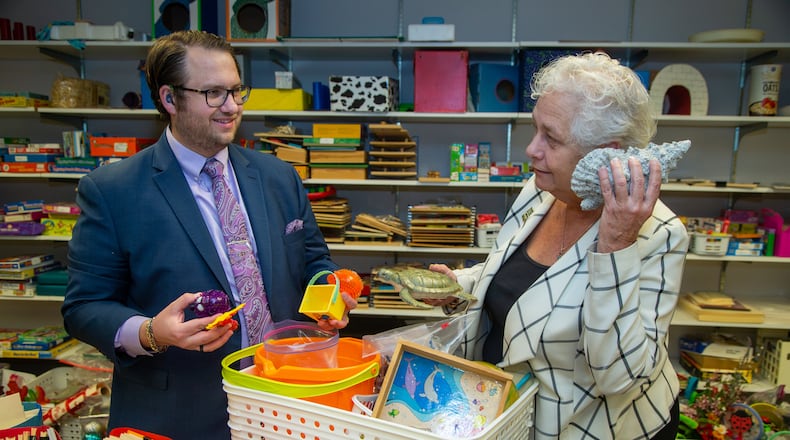Jonathan Brilling has a high school memory that still makes him smile more than a decade later.
At Riverside Military Academy in Gainesville, he was part of a competitive drill team that moved to slight non-verbal sounds – the click of shoes, the tap of a rifle against a belt buckle.
Though Brilling has been profoundly deaf since birth, he could follow the auditory cues with precision, and his drill team was one of the best in the state.
As a child, Brilling learned to hear and speak through auditory verbal therapy at the Auditory-Verbal Center in Atlanta, where he now works as the development and community engagement coordinator. The 30-year-old is a good communicator and often shares his story with client families unsure about their child’s future.
“Without this place, kids would be living in a silent world and not be able to communicate using spoken language with their families,” he said.
The nonprofit Auditory-Verbal Center (AVC), teaches profoundly deaf and hard of hearing young children how to interpret sounds and speak without the need for sign language or lip reading.
Credit: Phil Skinner
Credit: Phil Skinner
AVC is the only center of its kind in the state. A satellite office in Macon serves families in Middle and South Georgia. About 65% of client families are on Medicaid, and even those with private insurance may need some financial assistance during the long course of therapy.
Fundraising is the norm, from grants, fundraising events and individual donations to help those families in need to receive access to this type of therapy.
“I will never put a child on a waitlist, and I will never allow money to be a reason you don’t come,” said Debbie Brilling, AVC director for the past 19 years. Both of her children, Jonathan and his older sister Samantha, 32, graduated from the program.
The window of opportunity for deaf children to learn to communicate using this method is short, usually from birth to age 5. Stimulation of the brain’s auditory cortex should be at an early age, or it’s too late, said Brilling. Now, newborns are given a hearing test before leaving the hospital, thanks to legislation passed years ago with the support of AVC.
“You’ve got to get these kids as young as possible. We start as young as 2 months old,” Brilling said.
Ideally, once hearing loss is determined, AVC therapists begin their work. Once a child has access to sound through hearing aids or cochlear implants, they begin auditory verbal therapy to learn to hear and speak. The family-centered program depends on consistent work at home, in addition to weekly therapy visits. Children typically stay in the program two to five years before achieving age-appropriate expressive and receptive language. As a result, most never have to have auditory verbal therapy again and can attend school in a regular hearing classroom.
“By the time they go to kindergarten, they’ve caught up with children their age – if they’re wearing the devices like they’re supposed to, the family’s coming to all their appointments and doing the homework. So, you do have to implement the program, but if you do it, it works,” said Alison Tucker, AVC clinical supervisor and a certified auditory-verbal speech therapist.
Credit: Phil Skinner
Credit: Phil Skinner
Tucker is also a mom whose son graduated from the AVC program. He went through school and college as any normal-hearing kid would and is now married with a newborn son.
“With the (cochlear) implant and the training he had as a young child, he hasn’t been held back because of communication issues,” she said.
The center has 120 clients, 59 of whom were new in 2020. When the pandemic hit, the center immediately switched to teletherapy and will continue to offer teletherapy. To help their clients, they supplied tablets to 31 families and put the internet into homes of four families.
“We did whatever it took so that a family could continue to get their therapy during the pandemic,” Brilling said.
Tucker said teletherapy allows them to serve families out of state and out of the country.
Michael Green’s family moved from Houston to Atlanta to enroll him in AVC when he was around two years old. Now 31, Green works as a financial advisor with his family’s business after graduating top of his class in finance from Mercer University and the master’s program at Georgia State University. In addition, he serves on AVC’s Board of Young Professionals and helps with fundraisers so kids like him can access the therapies.
Green said the Auditory-Verbal Center provided the foundation he needed to be able to listen and speak.
“I feel like nothing can hold me back when it comes to deafness because I was able to learn how to speak. It’s made a drastic impact in my social life, dating life, athletic life, and studies as well, and of course my career.”
AUDITORY-VERBAL CENTER
Teaches children with mild hearing loss to profound deafness to listen and speak without the use of sign language or lip reading.
For more information or to make a donation: www.avchears.org/
About the Author
Keep Reading
The Latest
Featured




